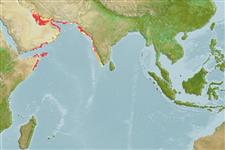Common names from other countries
Environment: milieu / climate zone / depth range / distribution range
पारिस्थितिकी
समुद्री; खारा ड़िमरसल; गहराई सीमा 1 - 50 m. Tropical; 30°N - 6°N, 49°E - 80°E
Western Indian Ocean: Persian Gulf and coasts of India.
आकार / वज़न / Age
Maturity: Lm ? range ? - ? cm
Max length : 83.0 cm TL पुल्लिंग / अलिंग; (Ref. 3627); common length : 20.0 cm TL पुल्लिंग / अलिंग; (Ref. 3507)
Adults occur in shallow coastal waters to moderate depths. Carnivorous. Sold fresh in markets.
Life cycle and mating behavior
Maturities | पुनरुत्पत्ति | Spawnings | Egg(s) | Fecundities | लार्वा
All populations matured as males during the first or second year (Ref. 52206).
Bauchot, M.-L. and M.M. Smith, 1984. Sparidae. In W. Fischer and G. Bianchi (eds.) FAO species identification sheets for fishery purposes. Western Indian Ocean (Fishing Area 51). volume 4. [var. pag.] FAO, Rome. (Ref. 3507)
IUCN Red List Status (Ref. 130435)
CITES (Ref. 128078)
Not Evaluated
Threat to humans
Harmless
Human uses
मात्स्यिकी: लघु वाणिज्य
साधन
Special reports
Download XML
इंटरनेट स्रोत
Estimates based on models
Preferred temperature (Ref.
115969): 25.4 - 27.9, mean 26.8 (based on 130 cells).
Phylogenetic diversity index (Ref.
82804): PD
50 = 0.5625 [Uniqueness, from 0.5 = low to 2.0 = high].
Bayesian length-weight: a=0.01413 (0.00903 - 0.02210), b=3.03 (2.90 - 3.16), in cm Total Length, based on LWR estimates for this species & (Sub)family-body (Ref.
93245).
Trophic level (Ref.
69278): 3.5 ±0.5 se; based on size and trophs of closest relatives
लौटाव (Ref.
120179): निम्न, न्यूनतम जनसंख्या दुगनी होने का समय 4.5 - 14 वर्ष। (tmax=11; K=0.28-0.38).
Fishing Vulnerability (Ref.
59153): Moderate vulnerability (39 of 100).
Climate Vulnerability (Ref.
125649): Very high vulnerability (87 of 100).
